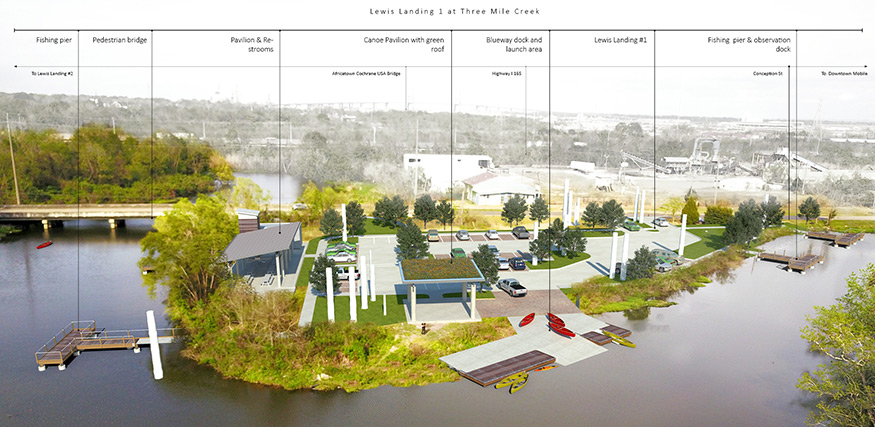MSU landscape architects earn award for Africatown investment
Contact: Reagan Poston

STARKVILLE, Miss.—Mississippi State’s ongoing commitment to the Africatown, Alabama community continues to bring honors for the Department of Landscape Architecture in MSU’s College of Agriculture and Life Sciences.
The Society of Outdoor Recreation Professionals is honoring the Africatown Connections Blueway planning team with a Project Excellence Award, with part of the project being a proposed MSU-designed kayak launch site in Africatown. The accolade is presented annually to collaborating agencies and organizations across the nation for exemplary outdoor recreation development.
The kayak launch site—located in the Africatown Connections Blueway, a water and walking trail network in Mobile County, Alabama—is one of five the MSU team designed at the request of the National Park Service in 2018.
Africatown is the landing site of the Clotilda, the last known ship to smuggle slaves into America. Many of the town’s residents are descendants of the original slave settlement, and this history and culture is something that both the community and the landscape architecture design team were passionate about acknowledging.
The launch site design began in MSU’s landscape architecture classrooms as part of a service-learning project, and though the class has since ended, the Africatown Connections Blueway planning team retains the spirit of the Project Excellence Award by remaining committed to assisting this community.
Robert Brzuszek, a professor in the MSU Department of Landscape Architecture and a project leader, shared his thoughts on the award.
“The Project Excellence Award creates a space for project teams to be recognized for their hard and important work. It’s especially motivating for our students because it’s a tangible way for them to see that they are impacting community lives for the better in projects that may still be in the conceptual phase,” Brzuszek said.
As part of this commitment to service-learning and to Africatown, in particular, the students of the Spring 2018 urban design studio traveled to the coastal community, talked to residents and visited local sites in an effort to understand the community’s needs.
Brzuszek and the entire Africatown Connections Blueway project team quickly came to understand the potential that exists for the community.
“The spirit of the Africatown community is remarkable. The people there have a strong sense of pride in their community, and they’re working hard to make sure that they can protect it. It’s inspiring to both the students and faculty in our department to see firsthand how people want their community to thrive. We’re grateful to be a part of that process,” Brzuszek said.
The launch site, spearheaded by landscape architecture graduate student Simon Powney, is one of the many designs that students created to bring outdoor recreation opportunities to the town.
“One of the big hopes of the community leaders was that we would be able to come up with designs that could bring them closer to the natural landscapes in a way that could help sustain the town,” Powney said.
The conceptual design for Africatown also consists of a large community garden, community pavilion and buildings that use the landscape to regulate temperature, among other things. Powney explained how the winning design was incorporated into the broader landscape.
“The canoe launch design, located on the quieter section of the creek, has a circular drive with parking that provides easy access to both the launch and the community pavilion. Around the site are five fishing and viewing platforms. The launch site forms the starting point of a 20-mile paddle way that reconnects the Africatown community with its waterway hunting and fishing heritage and with historically significant sites that are otherwise inaccessible from land,” he said.
“The navigable creeks give paddlers a glimpse of the natural ecology that once surrounded the community and was so important in its establishment,” he added.
Powney, who worked as an architectural designer and illustrator for a number of years before coming to MSU for a master’s degree in landscape architecture, shared the advantage of having students work on a project such as this.
“It’s a great opportunity for us to see the real-life applications of our work, but it’s also beneficial for the community. Students oftentimes provide a fresh perspective not previously tried in landscape architecture. Meeting with residents further engages students to create spaces that inspire the community,” Powney said. “If anywhere deserves innovative ways to help their town flourish, it’s Africatown.”
This is not the first recognition of the MSU landscape architecture work in Africatown. In 2019, the team received the Isaiah J. Whitley Founder Mobile County Training School Legacy Award, given by the Africatown School’s alumni association.
The Department of Landscape Architecture in the MSU College of Agriculture and Life Sciences offers undergraduate majors in landscape architecture, landscape contracting and management and a dual degree program. The College of Agriculture and Life Sciences offers 17 undergraduate academic majors, 28 master’s programs and 17 doctoral programs. For more information about the College of Agriculture and Life Sciences or the Department of Landscape Architecture visit www.cals.msstate.edu or www.lalc.msstate.edu.
MSU is Mississippi’s leading university, available online at www.msstate.edu.